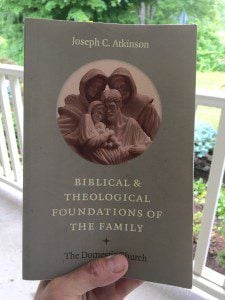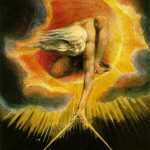People that hate the traditional family–you know, the natural family, the one instituted through the union of a man and a woman–these people love to quote Luke 14:26–
If anyone comes to me and does not hate his own father and mother and wife and children and brothers and sisters, yes, and even his own life, he cannot be my disciple. (ESV)
These folks also tend favor another passage. This one:
While he was yet speaking to the multitudes, behold, his mother and his brethren stood without, seeking to speak to him. And one said unto him, Behold, thy mother and thy brethren stand without, seeking to speak to thee. But he answered and said unto him that told him, Who is my mother? and who are my brethren? And he stretched forth his hand towards his disciples, and said, Behold, my mother and my brethren! For whosoever shall do the will of my Father which is in heaven, he is my brother, and sister, and mother. (Matthew 12:46-50, ESV)
 I recall a conversation in graduate school years ago in which someone with progressive political convictions threw those at me. The problem with using these proof-texts to advocate the abolition of the natural family is the rest of the Bible–particularly the 5th Commandment. Then there is the persistence of the biological realities: fathers and mothers. (Heather never really has two mommies. There is always a father.)
I recall a conversation in graduate school years ago in which someone with progressive political convictions threw those at me. The problem with using these proof-texts to advocate the abolition of the natural family is the rest of the Bible–particularly the 5th Commandment. Then there is the persistence of the biological realities: fathers and mothers. (Heather never really has two mommies. There is always a father.)
But there is also a logical problem. These are similes, and they are hyperboles. Sure, we must embrace what they mean, but their meanings draw on prior realities. That’s to say, you can’t be like a mother without real mothers in mind. The community Jesus is describing here is like a family, but without actual, biological families you’d never get his point.
But there are people who make a living by listing the crimes committed by Christians, but their lists seldom include the crimes of Christian heretics–especially the secular ones. And the most heinous of those heresies attempt to fully realize the eschaton in this world. These do tremendous damage because they deny the enduring nature of this creation.
This creation foreshadows the new creation, but it can never realize it. In part, this is what Joseph C. Atkinson is getting at in his marvelous study in Biblical and Theological Foundations of the Family:
The messianic reality is not totally extrinsic to our human reality but, in some mysterious fashion, it emerges from within the created order as well. It will be through the flesh and blood of the Messiah, through the matrix of human relationships (i.e. the family) and the organic interconnectedness which this affords (and which the corporate creation in Adam secures), that salvation will be procured and experienced. (p.202)
The Church is a bridge between this world and the next. It is a little of that world in this, and it is a seed of this world that will bloom in the next. But it is not either, really. The Church is the community of the already but the not yet.
As such it must affirm this creation and its ordinances, while simultaneously qualifying them, just as Jesus did.
The Church is a sojourning community, and this large tent, like Abraham’s, is filled with smaller tents. Those tents are households of faith, households constituted by fathers and mothers, and if so blessed, by children, too. Paul and the other writers of the New Testament make that plain.
And even though our households are just tents, temporary shelters on the way, they must be cared for and mended during the journey–both the large one we called Church, and the smaller ones we live in day by day. (Isn’t it marvelous that Paul was a tent-maker?)
Jesus, in point of fact, is the final destination, and the Church as we know it in this world, is sheltered by him. And his first advent occurred within a family–a traditional, natural, Jewish family, with a mother, and siblings, and even a paterfamilias. And with this in mind we should continue to affirm the traditional, natural family.
That doesn’t mean the natural family hasn’t been transformed by Christ. But its transformation is an outworking of those things in its life that were there from the start. It isn’t an the imposition of something utterly alien. And it sure isn’t the abolition of the traditional, natural family. How could we imagine otherwise? He is the one through whom all things were created. Only a Gnostic would think otherwise. (And now you know what I think of those who would over-realize the eschaton–I’m with Voegelin.) Here’s a choice quotation from Atkinson again:
The introduction of a genuine new principle (i.e. Christ) effects a radical transformation of all things; including the family. This new principle does not destroy things but fulfills them so they can effectively operate within the design of salvation, but now in a Christological manner. The carrier of the covenant (the family) becomes now the eschatological sphere of activity, i.e. the place where the Holy Spirit is active in a unique way to bring about the salvation of the world. (p.209)
The inability of many modern Christians to think in these terms just goes to show how deeply and thoroughly they have been baptized into the atomic individualism of the modern age. We don’t create the church by our decisions to follow Jesus. Instead we are baptized into him.
And this is why baptizing babies is so important, among other things.
___
Here’s something else for you to enjoy. Wipf and Stock, the publisher of my book, Man of the House, has given me permission to share a little sample of the book with you. The hope, of course, is you will like it enough to purchase a copy. Enjoy!.
Click here to download the book excerpt as a PDF: Man of the House_Excerpt












